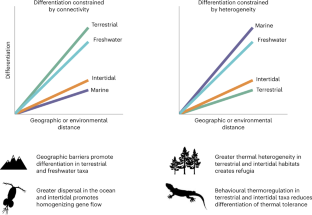新しい研究により、海洋生物はこれまで考えられていたよりも温暖化に対して耐性がある可能性が示された New research shows that marine species may be more tolerant to warming than previously thought
2022-12-01 マサチューセッツ大学アマースト校
共同研究者たちは、過去に発表された90件の研究をメタ分析し、61種のデータを収集して、それぞれの種が生存できない温度(「上限温度」)を設定することに成功した。しかし、61種から抽出した305の個体群をさらに詳しく調べたところ、同じ海洋生物でも個体群によって温度限界が大きく異なることが判明した。このことは、ある個体群は高温に耐えるための異なる能力を進化させてきたことを示唆している。そこで重要なのは、同じ種の異なる個体群をつなげておくことで、高温に適応した個体群が、温度限界の低い個体群にその優位性を引き継ぐことができる。
<関連情報>
- https://www.umass.edu/news/article/save-nature-focus-populations-not-species
- https://www.nature.com/articles/s41558-022-01534-y
陸上種よりも海洋種における温度限界の進化的分岐の大きさ Greater evolutionary divergence of thermal limits within marine than terrestrial species
Matthew Sasaki,Jordanna M. Barley,Sarah Gignoux-Wolfsohn,Cynthia G. Hays,Morgan W. Kelly,Alysha B. Putnam,Seema N. Sheth,Andrew R. Villeneuve & Brian S. Cheng
Nature Climate Change Published:01 December 2022
DOI:https://doi.org/10.1038/s41558-022-01534-y

Abstract
There is considerable uncertainty regarding which ecosystems are most vulnerable to warming. Current understanding of organismal sensitivity is largely centred on species-level assessments that do not consider variation across populations. Here we used meta-analysis to quantify upper thermal tolerance variation across 305 populations from 61 terrestrial, freshwater, marine and intertidal taxa. We found strong differentiation in heat tolerance across populations in marine and intertidal taxa but not terrestrial or freshwater taxa. This is counter to the expectation that increased connectivity in the ocean should reduce intraspecific variation. Such adaptive differentiation in the ocean suggests there may be standing genetic variation at the species level to buffer climate impacts. Assessments of vulnerability to warming should account for variation in thermal tolerance among populations (or the lack thereof) to improve predictions about climate vulnerability.

